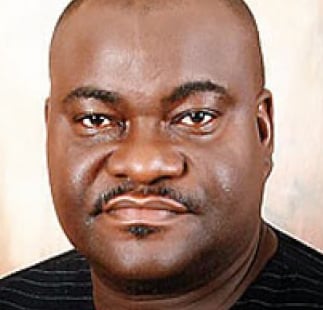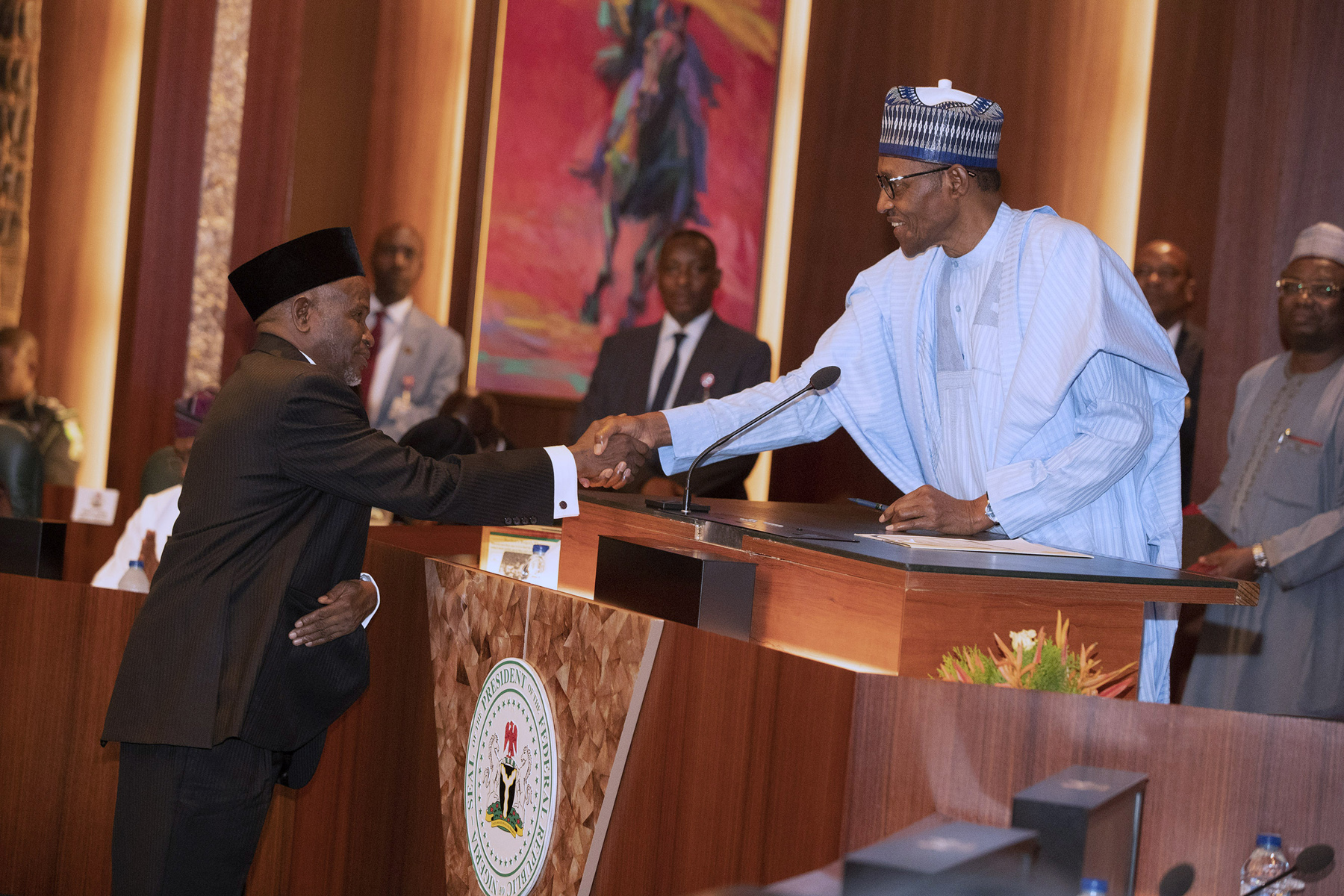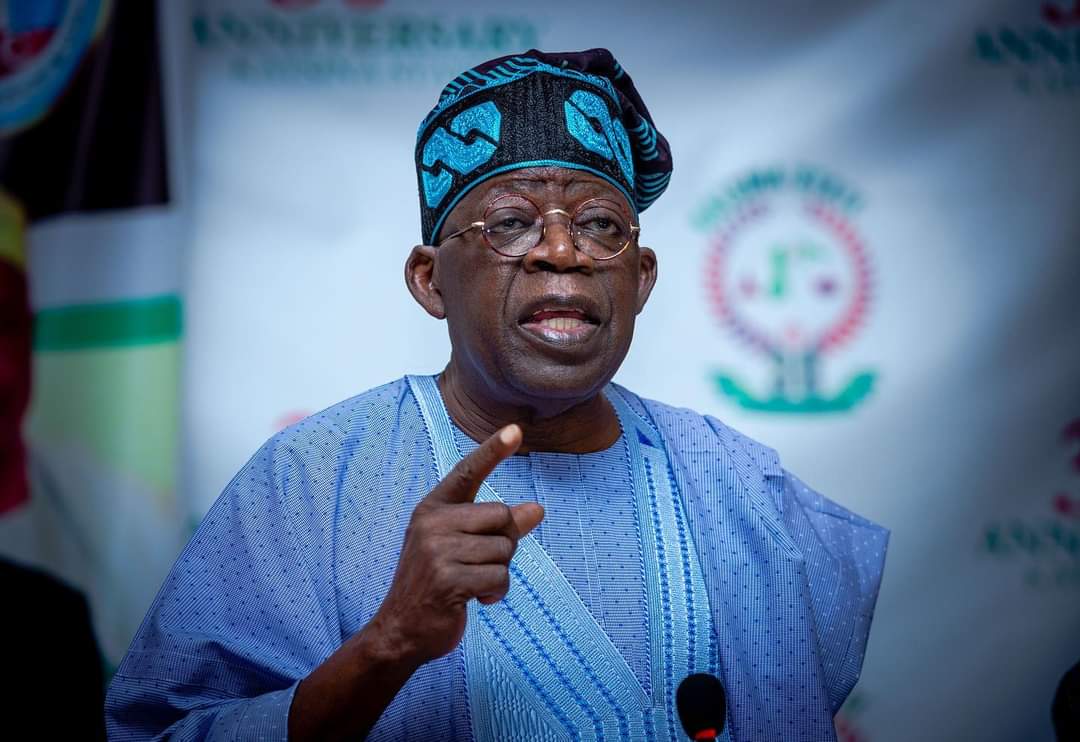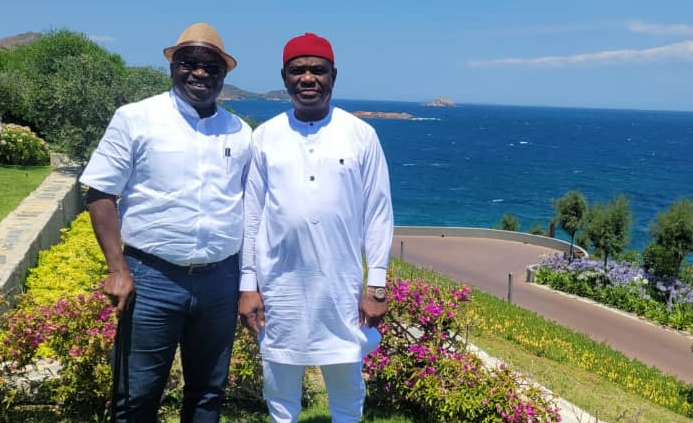PRESIDENT BUHARI PRESIDES OVER POLICY RETREAT 1A&B. President Muhammadu Buhari in a handshake with the Newly Sworn-in Chief Justice of Nigeria (CJN), Hon Justice Tanko Muhammad held at the Council Chambers at the State House Abuja PHOTO; SUNDAY AGHAEZE. JULY 24 2019
Muhammadu Buhari, Nigeria’s president, was not a happy man on Monday, June 27, 2022. Students of “body language methodology of governance, administration and communication” know what I mean. It was invented into the lexicon of contemporary Nigerian political discourse, following the ascendancy of the Buhari presidency, in 2015. It is a theorem that enables aides of the president and government functionaries to deduce from the non-verbal attitudes, dispositions and signs of their principal, what he expects them to do in every situation.
The idea is to reinforce the fact of the president being a man of very few words, certified taciturn actually, who expects people to “borrow themselves brain,” as the Nigerian day-to-day expression says. They are thus expected to get cracking on their briefs in whatever ways without the benefit of a conversation or exchange of ideas in some form with their principal. How this has profited the country in Buhari’s over seven years in office is the subject of another treatise.
At other times, Buhari indeed reinforced this characteristic of himself in his public outings. A visiting French president, Emmanuel Macron, in 2018, entertained a press conference in the statehouse with Buhari, his host, flanking him. When the question about the nationwide menace of herdsmen was raised, Buhari looked the other way. It was so visible even on television. He surely was not comfortable with that poser. His spontaneous reaction spoke volumes. You should have also read his discomfiture as he sat in the state box at Eagle Square the other day at the presidential primary of his political party, the All Progressives Congress (APC). He wore this kind of “You guys get this thing done quickly so I can get out of here” visage for most of the programme.
On the night of Sunday, June 26, 2022, Buhari received an unexpected correspondence from the immediate past chief justice of Nigeria (CJN), Ibrahim Tanko Muhammad. He had notified the president in his mail that he was retiring voluntarily from office “with immediate effect”, an expression loaned from our several decades under military rulership. Muhammad pleaded faltering health as the grounds for excusing himself from office. Ordinarily, he was due for retirement in 2023, by which time he would have attained the retirement age of 70 years for jurists in the Supreme Court of Nigeria. Professors in Nigerian universities are also given such latitude against the backdrop of the peculiarity of their professions as human storehouses of irreplaceable knowledge, expertise and experience.
Advertisement
Muhammad’s decision caught Buhari by surprise. He had just returned from the Commonwealth Heads of Government Meeting (CHOGM) in Kigali, the capital of Rwanda, a country which is fast displacing Nigeria as the most preferred event destination in sub-Saharan Africa. Tanko Muhammad was tactically procured in early 2019 by functionaries of the Buhari administration. He was primed as the foremost, statutory judicial enforcer of the re-election of Buhari, March 2019, two months away. It was glaring from the abysmal, multisectoral failure of the subsisting administration which was voted into office in 2015, that Nigerians had totally lost patience with the regime. The party which produced the president wouldn’t be humoured with a second term in office. Buhari’s strategists, all downstream beneficiaries of his government, spun a spurious narrative to force Muhammad’s predecessor, Walter Onnoghen, to resign from office.
The fable was that Onnoghen was in bed with Buhari’s major opponent in the 2019 polls, Atiku Abubakar of the Peoples’ Democratic Party (PDP). Onnoghen was rumoured to have held an offshore meeting with Atiku at the latter’s Dubai abode after the PDP presidential primary in late 2018, which Atiku won. As the spin doctors couched it, Atiku would seek legal redress after being trounced by Buhari at the polls. Onnoghen would subsequently deploy his position as CJN and allied judicial instruments to rule in favour of Atiku and enthrone him as president.
As legal proceedings progressed, however, it was the APC government whose security operatives hounded the PDP “Situation Room,” which had all the results of that election direct from every polling unit across the country. The Independent National Electoral Commission (INEC) hurriedly pulled down its server which stored the authentic poll results, swearing it never had one. Such was the frenzy Buhari’s associates got themselves into, attempting to legitimise the grossly illegitimate election results. History will yet unravel the complicity of many present public officials in that subterfuge when the time is right.
Advertisement
Tanko Muhammad was therefore elevated to upstage Onnoghen, his senior colleague. He functioned first in an acting capacity beginning from January 25, 2019, when he was first appointed. He became substantive CJN on July 24, 2019, and concurrently chairman of the National Judicial Council (NJC) after discharging his primary task — returning Buhari as president. His appearance before the senate for clearance saw him commit an unforgettable howler. His response to the question about whether the apex court under his jurisdiction will rely upon the merits of cases, or technicalities to adjudicate, gave him away as half-baked, possibly mediocre. His analogy about his suitability to “drive an aeroplane” or not, reinforced notions about his suspect capacity.
US-based Nigerian attorney, Emmanuel Ogebe, has proffered that: “Tanko came to office with a palpable integrity deficit”. Ogebe advanced this in his post-disengagement tribute to Muhammad, which he titled ‘Justice Tanko’s Resignation: End of an error’. What was to follow, Ogebe noted, “was further proof of his competency deficiency. The judge who couldn’t define technicality in his senate confirmation hearing, apparently was technically unfit to be chief justice of Nigeria,” Ogebe submitted.
Sadly, Nigeria’s “rubber stamp” legislature, led by the never-to-be consensus presidential candidate of the APC for the 2023 polls, Ahmed Lawan, confirmed his nomination with aplomb. This was in total obeisance to the “body language” of the president. Not even the fact that Muhammad studied Islamic law and not conventional law was questioned at that outing in the senate.
At the inauguration of Muhammad’s successor, Olukayode Tajudeen Ariwoola, Buhari devoted ample time to celebrating the outgone CJN. He noted he was reluctant to accept Tanko Muhammad’s correspondence because he was confident the former CJN would outlast his own administration and retire on December 31, 2023, months after his exit. Buhari extolled Muhammad’s dispensation for ensuring “landmark, jurisprudential and policy decisions by the supreme court”. Tanko was praised for dealing “firmly with the issue of reckless and indiscriminate grant of ex-parte orders, which was assuming serious dimensions”. History, Buhari observed, “will be kind to Justice Tanko Muhammad for his modest contributions to Nigeria’s judiciary, the strengthening of our democracy and national development”. He subsequently conferred on Muhammad, the second-highest national honour, that of Grand Commander of the Order of the Niger (GCON).
Advertisement
Tanko Muhammad’s stint as CJN was dogged by controversies in various forms and shapes. Under his superintendence, the home of Mary Odili, the next in rank and seniority in the supreme court to Muhammad, was stormed by agents of government in Gestapo fashion on October 29, 2021. Whereas the stormtroopers pretended to be executing a search warrant, the raid was generally perceived to have been designed to maim and kill the target, Mary Odili. It re-echoed a similar invasion of the homes of some judges in 2016 in Abuja and Port Harcourt respectively. The earlier raid was carried out by operatives of the State Security Services (SSS).
For the first time in the history of the supreme court, a total of 14 out of 16 justices in the court, authored a jointly signed petition days before Muhammad’s resignation. They decried abysmal working conditions under his leadership. They drew attention to the homelessness of many judges and the unsavoury conditions they had to work in. The judges listed non-replacement of their aged official vehicles, denial of training opportunities for capacity building and the decrepit condition of the supreme court clinic among other challenges.
They highlighted the cancellation of their foreign summer holidays consistent with international best practices, whereas the CJN regularly obliged his family and personal aides to these privileges. Things as basic as non-payment of subscriptions for internet services and satellite television also featured on the list of irritants of the supreme court justices under Tanko Muhammad’s leadership. The justices equally complained of being forced to exit their chambers by 4pm every day, owing to frequent power outages and the skyrocketing costs of maintenance of diesel generators.
Simply put, the correspondence was a tacit vote of no confidence in the leadership of the former CJN. Muhammad allegedly introduced a new tradition of judicial laziness into the operations of the supreme court. He was reputed as lacking the basic ability to comport himself to write well-reasoned judgments. Rather, he was notorious for commandeering cases, preempting and dictating outcomes and disallowing dissent.
Advertisement
Indeed in May this year, a former supreme court judge, Ejembi Eko, alluded to the festering sleaze in the judiciary, under Tanko Muhammad. In his valedictory address upon retirement, Ejembi Eko spoke about the “vandalisation of the budget of the judiciary, culminating in the lack of basic needs of justices”. He expressed his bewilderment about the pauperisation of the topmost rungs of the judiciary despite remarkable increases in budgetary allocations. Eko invited the Economic and Financial Crimes Commission (EFCC) to investigate the accounts of the supreme court. Such has been the quantum rot and decay in the nation’s uppermost court in recent years, especially under the jurisdiction of Tanko Muhammad.
The former CJN reportedly spent weeks in recent months being variously scrutinised for all manner of malfeasance. There was a report to the effect that Muhammad was queried by the SSS over a $10 million bribe reportedly collected on his behalf by one of his children, for a favour requested by Aliyu Wamakko. The erstwhile governor of Sokoto state and ranking member of the upper parliament, who was said to have made the payment, reportedly squealed when his request was not being prioritized nor addressed.
Advertisement
On June 22, 2021, Messrs Malcolm Omirhobo and Co, legal practitioners sent correspondence to Muhammad, requesting “certified true copies of certain public documents”. The attorneys said they were acting “pursuant to the Freedom of Information Act 2011”. Among others, they requested “proof of receipt of total funds disbursed by the National Judicial Council (NJC) to the supreme court since January 2019”. They equally requested the financial statements of accounts of the supreme court, proof of the total expenditure and payment vouchers processed by the organisation since 2019. Omirhobo and Associates equally requested information about internally generated revenue within the period, proof of expenditure, salary payments and so on.
Arising from the dust and whirlwind of petitions, complaints and controversies thrown up by Muhammad’s regime in the supreme court, the senate has shown interest in interrogating the tenure of the former CJN. The senate committee chairman on the judiciary, human rights and legal matters, Opeyemi Bamidele, brought this up as a “matter of urgent public importance” on the floor of the upper parliament on Tuesday, June 28, 2022. Irrespective of Muhammad’s resignation, complaints against Muhammad will be investigated as part of efforts to restore the integrity and public confidence in the judiciary. Himself an attorney, Bamidele is concerned that at no time has the credibility of the judiciary been so mindlessly rubbed in the mud and rubbished as it has in recent years.
Advertisement
Almost immediately after the inauguration of Ariwoola as acting CJN on Monday, June 27, 2022, the ever-sleepless social media threw up a collage of photographs. A particular photoshoot pitched the president’s mien at the inauguration of Tanko Muhammad three years ago, with his facial expression at Ariwoola’s. While it was an uncharacteristically bright and bubbly Mr President flashing a gap-tooth smile of accomplishment at Muhammad’s swearing-in. It was a visibly, evidently dour, drawn president who shook hands with Ariwoola. That sense of loss of a trusted ally, a handy hatchet man was inscribed all over his face. Motion pictures of the event captured a president who almost couldn’t wait for press photographers to complete their job so he could retire to his trademark closet. A new CJN from the south of the country for that matter may be bad business ahead of 2023.
Sadly, history cannot be fair to Tanko Muhammad, the way the president desires, irrespective of the GCON necklace he was adorned with. His legacy of laziness, the imprimatur of ineptitude and trenchant treachery did not cover him in gloss at all. A very bitter Ogebe has advanced that: “The worst president of Nigeria appointed the worst chief justice of Nigeria…That Tanko would be a failure was expected. How disastrously he failed was the surprise. Never in the history of Nigeria’s legal system have all 14 justices in the supreme court petitioned the CJN this way”.
Advertisement
Hopefully, Tanko Muhammad will be the guest of some intelligence and investigative agencies and bodies in the coming weeks and months. That is hoping there wouldn’t be a re-enactment of the “off the mic” episode during the house of representatives’ inquisition into the affairs of the Niger Delta Development Commission (NDDC) not too long ago. Such media trials have become the trademark of our corruption and crime-busting departments. Whether such bodies will be sufficiently courageous as to dispense appropriate penalties and sanctions as deterrence for future offenders is another matter.
Olusunle, PhD, poet, journalist, scholar and author, is a Member of the Nigerian Guild of Editors (NGE)
Views expressed by contributors are strictly personal and not of TheCable.







